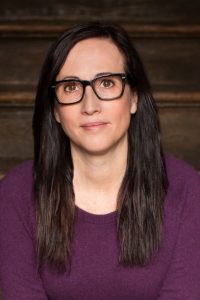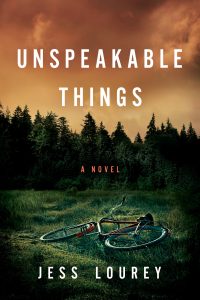I Write Crime Fiction to Tell the Truth
 I Write Crime Fiction to Tell the Truth
I Write Crime Fiction to Tell the Truth
May Day, my first published mystery, released March 8, 2006. It took me another ten years to reveal to the world via a TEDx Talk that I’d written it as a response to my husband’s suicide. In the decade between May Day’s publication and my TEDx, when asked, I’d offer flip, partially true answers about where I’d gotten the inspiration for the book: Minnesota has long winters, I had poor TV reception, why not write a novel? After all, May Day is a comic caper mystery. I didn’t want to shatter the good time with the sharp truth: writing it was my cry for help and my search for truth and justice after my world exploded.
I’ve written eighteen novels since, and all of them expose a truth that couldn’t be told so honestly outside of fiction: a character who shares a shameful secret with me, the personal cost of political sexism, the ugly shapes fear takes when it goes unacknowledged. But despite having threads of vulnerable honesty, none of my other novels arrowed to the heart of truth like May Day until my latest book, aptly titled Unspeakable Things.
Unspeakable Things is, I hope, a suspense novel so taut, so incendiary, that it keeps you up long past your bedtime. It’s also the true story of my childhood, true in a way that only fiction can be. Here are the facts: My father was a Vietnam vet and an alcoholic with PTSD and a sex addiction, and my mother was and still is his wingman. I grew up in a house with swinging parties, drugs, and abuse, where my sister and I were cautioned not to tell because no one would understand our family’s “creativity and genius,” and where my father created in the winding woods glorious art installations alongside booby traps to catch trespassers.
My house wasn’t the only war zone. There was also my hometown of Paynesville (a name, by the way, too on the nose to ever make it into fiction). Paynesville in the ‘80s was the home to at least two notorious sex offenders and a series of sexual assaults on children that didn’t get solved until 2016. The attacks had been going on for years but made national news on October 22, 1989, with the disappearance of Jacob Wetterling, a sweet-faced eleven-year-old who was abducted while biking back from a Tom Thumb with his brother and friend.
You can’t live in Minnesota, as I do, and not know the facts of the Wetterling abduction or feel protective of the Wetterling family, given all they’ve suffered and the humbling grace and kindness with which they’ve responded. Less well-known is the trauma of the other boys, the ones who were assaulted and freed during the ‘80s, though season one of the American Public Media podcast In the Dark touches on their experience as well as the series of horrifying missteps made in investigating the cases.
When Jacob’s killer finally confessed in 2016, it was difficult for me to watch the news. I can’t imagine the agony it stirred in his victims and their family. Because I felt so unmoored, so unsettled by all the memories the confession had awoken, I invited some of my Paynesville classmates to my house to figure out what childhood experiences we shared.
We caught up over cake and wine, talked about our kids and jobs, and eventually got to the pain and fear we’d felt growing up. I learned that my home life, surprisingly, wasn’t the worst. That the curfew siren I’d remembered was real. That the children of Paynesville called our bogey man Chester the Molester, and he’d been real.
I began outlining Unspeakable Things the next day. The true story that I wanted to tell was about the powerlessness of children. Is there anything more terrifying than knowing the monster under your bed is real? But I also wanted to write about our resilience, our ability to hang onto hope in a world that seemingly had no place for it. I wanted to grab the hands of all those kids, myself included, and walk us through that darkness and into the light. To do that, I couldn’t tell the factual story of that period in Paynesville. I needed to crunch timelines, create composite characters, and add and delete details to reach the deep down below, where the gospel of our lives exists.
And Unspeakable Things needed to be a mystery, because nothing delivers truth and justice like crime fiction.
—
Jess Lourey writes about secrets. She’s the bestselling Lefty, Agatha, and Anthony-nominated author of nonfiction, YA adventure, magical realism, comic capers, suspense, and thrillers. Jess is a tenured professor of writing and sociology, a recipient of The Loft’s Excellence in Teaching fellowship, a Psychology Today blogger, a writing retreat leader, and a TEDx presenter. She lives in Minneapolis with her family and her foster cats, and her latest book, Unspeakable Things, releases January 1, 2020. You can find out more at jessicalourey.com
UNSPEAKABLE THINGS
 Inspired by a terrifying true story from the author’s hometown, a heart-pounding novel of suspense about a small Minnesota town where nothing is as quiet—or as safe—as it seems.
Inspired by a terrifying true story from the author’s hometown, a heart-pounding novel of suspense about a small Minnesota town where nothing is as quiet—or as safe—as it seems.
Cassie McDowell’s life in 1980s Minnesota seems perfectly wholesome. She lives on a farm, loves school, and has a crush on the nicest boy in class. Yes, there are her parents’ strange parties and their parade of deviant guests, but she’s grown accustomed to them.
All that changes when someone comes hunting in Lilydale.
One by one, local boys go missing. One by one, they return changed—violent, moody, and withdrawn. What happened to them becomes the stuff of shocking rumors. The accusations of who’s responsible grow just as wild, and dangerous town secrets start to surface. Then Cassie’s own sister undergoes the dark change. If she is to survive, Cassie must find her way in an adult world where every sin is justified, and only the truth is unforgivable..
Category: Contemporary Women Writers, How To and Tips
























